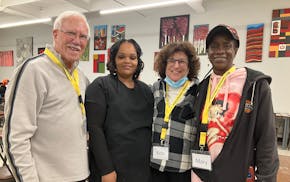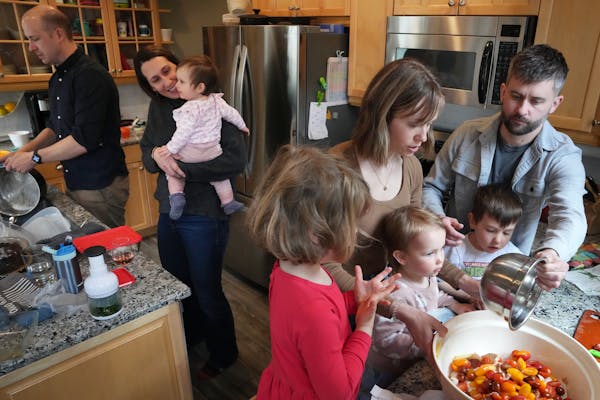The phone call woke Ron Lemmer at half past midnight, Chennai time. "Where are you?" asked his doctor. "I'm five minutes away," Lemmer replied. Stay put, the doctor said, and wait for my call. Everything was falling into place. Two hours later, Lemmer, of Prior Lake, walked alone through a gentle rain to a private hospital and became what is thought to be the first American recipient of a heart transplant in India.
In Minnesota, Lemmer lives within a 90-minute drive of three world-class transplant centers. But this year he defied his hometown doctors to join the growing ranks of "medical tourists" seeking donor organs in the world's poorest countries. It's a journey fraught with moral and medical hazards, and his own doctors tried desperately to talk him out of it.
"[They said] we were making a terrible decision," said his wife, Shelly. "I'm going to come back with my husband in a box."
But once Ron Lemmer made up his mind, there was no looking back.
The Lemmers had been married only a few weeks when Ron, 65, went to the hospital last January for what he thought would be an overnight stay. His heart had been slowly failing since a heart attack in 1998, and doctors wanted to put in a pacemaker. But complications set in; his heart started "pumping like crazy," he said, and other organs started shutting down.
"We celebrated our third week anniversary in the hospital," said Shelly, "and our fourth week and our fifth."
After 23 days, Lemmer rallied enough to go home. But his cardiologists said he would likely die within a year without a new heart. So he put his name on the transplant list at Abbott Northwestern Hospital in Minneapolis.
Facing a long wait
In the United States, about 3,100 people are waiting for heart transplants, 133 in Minnesota, all on the same national list. When a donor heart becomes available, it's offered to patients based on a priority scale, including how sick they are and how long they've been waiting.
The Lemmers said they were told it could take 18 months. Nationally, the median wait time for someone in Ron's priority level (1B, or second highest) was 73 days, according to the United Network for Organ Sharing. But some wait for years, and last year 359 people died waiting.
Lemmer's doctors said they could buy time by implanting a mechanical device, known as a left ventricular assist device, until a donor heart became available. But Lemmer balked. He's the kind of guy who rarely sits still. He built his own lake home by hand, and likes to tinker with his collection of old cars, motorcycles and boats. He also runs a glass-making business in Minneapolis, and didn't like the idea of being tethered to a power pack.
"No, I wanted an organ," he said.
He remembered reading a magazine article about transplants in India, and found Apollo Hospital on the Internet. It's part of a private chain that had recently launched a heart transplant program in Chennai (formerly known as Madras).
After checking with friends, including a doctor and nurse of Indian descent, Lemmer contacted Apollo. The surgeons, who had trained in England, said he might get a new heart in as little as two weeks, he said. It would cost $65,000 in cash (about a tenth of the cost in the United States) plus living expenses.
"I called Shelly and said 'We're going to India.'"
The doctors' doubts
The transplant team at Abbott tried to warn the Lemmers about the dangers.
"There's a reason that everyone in the world wants to come to the U.S. for their medical care, and not the other way around," said Dr. Nader Moazami, director of Abbott's heart transplant program.
There are few operations more complex than this one, he said in an interview, and success depends on a lot more than the quality of the surgeons. In this country, he said, an elaborate system makes sure the donor's family gives consent; that the organs are tested for infections and disease; that they're safely transported, and that the recipient is properly prepared, cared for and closely monitored.
"This whole process requires a village," Moazami said.
Lemmer, though, was willing to take his chances, even though the Indian hospital had only done about 10 transplants. On May 5, he and Shelly arrived in Chennai, a city of 8 million on the Bay of Bengal, and were whisked by limo to Apollo Hospital.
Shelly Lemmer wasn't quite prepared for what she encountered. Goats and cows shared the streets with cars and motorcycles; and for several days, she slept on the dirty floor of her husband's hospital room.
Eventually, they checked into a bed-and-breakfast and played tourist while the days turned into weeks.
They learned that Indian nationals get priority over foreigners for donor hearts. But as a practical matter, poverty limits demand -- Indians, too, must pay cash, and most can't afford transplants.
After two months the Lemmers were almost ready to give up, and Shelly flew home for a family reunion. Then came the call on July 21, and Ron's midnight walk to the hospital.
He woke up the next morning in intensive care and felt his chest. He wondered if the surgery had been called off, because he felt no pain.
He learned that he had received the heart of a 36-year-old laborer who had been killed in a motorcycle accident, leaving a wife and two young sons. "I asked the doctor, 'Is there something I can do? Can I contact the family?'" The doctor told him, "No, it's anonymous."
Lemmer recovered so quickly that he was discharged in 10 days. Before he left, the hospital asked if he would participate in a news conference. That's when he learned he was the first American, and the oldest person, to get a heart transplant in India.
Ethical questions
Although medical tourism has boomed in recent years, no one knows how many Americans go abroad for transplants, said Leigh Turner, a medical ethicist at the University of Minnesota.
"So often when these hospitals have a patient and [the] procedure goes reasonably well, they do a lot to take advantage of it and get press coverage," he said. "This is basically an industry that's trying to promote India as a destination for international patients."
The concern, he said, isn't just about quality of care, but about the whole business model: poor countries lavishing scarce medical resources on the elite few.
"What you get is a kind of crowding out effect," he said. "You get the patients from wealthier countries getting access to health services," while most local people cannot.
Ron Lemmer knows that he had advantages that his donor never had. "I think about this gentleman all day," he said.
Before he left, Lemmer paid a visit to an ashram, or Hindu temple, in the donor's home town. "He told me," said Shelly, "that he wanted to bring that young man's heart home one last time."
Lemmer came home in August after 96 days in India. Today, he says he feels great. But when he returned to Abbott, doctors discovered that his body was starting to reject his heart. They had to adjust his medications to stabilize him, and continue to provide follow-up care.
"I hope people don't get the impression that they performed a miracle in India," said Moazami.
To Ron Lemmer, though, it feels that way. "We all know I'm lucky," he said. As he told his wife, "I will forever now live, love and dance with an Indian heart."
Maura Lerner • 612-673-7384
News anchor Poppy Harlow announces departure from CNN
Orange crush: Boats packed with revelers tour Amsterdam canals to celebrate the king's birthday

